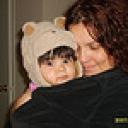Yahoo Answers is shutting down on May 4th, 2021 (Eastern Time) and beginning April 20th, 2021 (Eastern Time) the Yahoo Answers website will be in read-only mode. There will be no changes to other Yahoo properties or services, or your Yahoo account. You can find more information about the Yahoo Answers shutdown and how to download your data on this help page.
Trending News
Would a toddler NOT expossed to baby talk have the same cognitive development?
What if all adults around don't use Motherese with the toddler? Would that create a disadvantage for the baby? Or would it be the same?
14 Answers
- 1 decade agoFavorite Answer
I studied child language acquisition at college years ago, and studies have shown that not only does Motherese exist with identical traits in every language, but that young babies respond more to Motherese, even if it isn't in their own language. (So an English 3 month old would respond more to someone speaking Motherese/Japanese than they would to someone speaking non-Motherese/English.)
It's almost instinctive to heighten the pitch of ones voice and repeat many words... it's like inbuilt programming! And I can't see any other reason why Motherese would exist across the world in every culture other than because it works so well.
Because Motherese is so instinctive, some women will swear they never use it, but actually do without realising - seriously! (I know several, and would include myself in that group). Otherwise, they misunderstand what Motherese is (maybe assuming it purely means things like "Who's a cheeky weeky wickle boy den?"... I know I don't speak to my toddler like that.)
I guess I'm saying: show me the child who was never spoken to in Motherese and then we can start considering whether they're at a disadvantage. I don't believe that child exists.
ETA: I just read your other answers and it's quite clear many people don't actually understand what Motherese really is. It's not all silly words/baby babble... that CAN be part of it, but it's not the be all and end all!
- 1 decade ago
Well, according to generative studies Motherese is basically what you would call postive exposure or experience, which doesn't guarantee the child's cognitive development though it is certainly useful.
Since learning a language is an innate, biologically endowed ability the child's cognitive development will progress somehow even if it doesn't have any kind of input.
Given the case that the child is raised without hearing a single word, although being cognitively equal to other babies they will not speak the language, probably only babbling; though this is extremely unlikely since every child is bound to hear some kind of talk even for afar.
- DoethinebLv 71 decade ago
I think that it is part of the child's development for adults to encourage him by using words back to him. That makes him feel assured that he has managed to communicate and that he has been understood. I don't think that this form of encouragement is using Motherese as such. It is simply helping him along the way. Even smiling isn't entirely spontaneous for a baby -- people smile around him and he copies. And then they are so delighted that they smile rapturously back!
Even if the adults round a child simplify their language to talk to him (which is not, I think, the same as Motherese), it is remarkable how much information he picks up elsewhere, by listening to adults talking among themselves and from radio and television. This again is part of his normal development.
There is more to cognitive development than speech -- my elder son, for instance, was from an early age very good at putting things together and was a very early walker. He invented a few words of his own which have passed permanently into the vocabulary of our family!
- Anonymous1 decade ago
Motherese is proven to be successful. Peer reviewed research would endorse it as a communicative technique for promoting language development. It is about the interaction as well as the words.
Broadly, you're asking the nature / nurture question - is a child delayed cognitively due to genetics, or lack of experience?
The answer, in my opinion is both. A child who is developmentally delayed will not acquire language as quickly as a normally developing child. But if you look at the case of Genie, the child who was locked away from social contact, it is clear that a child who is not stimulated cal lose cognitive potential. It appears that there are windows of opportunity in cognitive development; if these windows are not used, a child can lose cognitive potential.
James Law is eminent in this area, he has written many papers on this very topic
Source(s): Speech and Language Therapist - How do you think about the answers? You can sign in to vote the answer.
- Melissa MLv 71 decade ago
Doubtful. Apparently, people the world over use a lilting tone when talking to infants.The important thing is to expose them to more than just the lilt and to provide them with vocabulary.Singing to them is probably not a bad idea either.I never used "baby" words but I did do the lilting. A few previous years of studying language development had taught me that it is was important.
Source(s): Ps.I used iconic sign language ,too. (Not the abstract ones) - threenornsLv 71 decade ago
it is definitely a disadvantage. the purpose of baby talk is to engage the child's interest in vocalizing. the higher pitch we instinctively use is better suited to their hearing and the repetition of syllables helps cement the basic language blocks.
if you tell a preverbal child "would you like a drink of milk or a drink of water?" [because some ppl mistakenly and out of delusion think they're doing a Good Thing by bombarding the child with a complicated set of sounds and structural rules from the beginning], you've lost him. he's more likely to resort to pointing and grunting or using non-verbal means of communication.
it's easier for him to grasp "want moo? want wa-wa?" - he makes a sound, you give him a drink - from his perspective, that's gold! once he's saying, f.ex, "want wa-wa" consistently and getting a consistent response, you extend it - "want wah-TER.... wah-TER... you want wah-TER". it takes time - can take a week or more - but if you consistently correct him and only give him the water when he at least attempts "wah-ter" ("wa-dah", "wa-doh", anything but "wawa"), he learns to say the word properly. then you teach him to say "i want" - "i want water". and so on.
you're not doing the child a favour by dropping him in the deep end of fully-realized language and grammatical structure. it's like handing your 9mo old a pair of figure skates when she's not even worked out how to stop herself from falling on her butt every time she lets go the furniture.
source: my oldest daughter (nearly 24) spoke like a little professor when she was 2 - complete sentences and all - even though i used baby talk etc when she was little. my second (now nearly 21) and now my third (almost 3) have severe speech problems so i know a LOT about speech development from all the therapy and exercises we are going through.
- 1 decade ago
I believe more baby talk could delay development. Children can hear the correct words, but they cannot say them correctly until their speech is properly developed. So if adults choose to "dumb down" their words to baby talk, the child will consider that to be normal talk and develop as such. Then the child will have to relearn the correct pronounciation and usage later on.
- 1 decade ago
When my mum and I taught my 2 year old, we tried to talk to him in a normal language, explaining hard words in words that he understood.
We made sure that we spoke to him in the correct pronounciation and made sure he used the correct pronouns. Now he is almost three, and can talk quite well.
- 1 decade ago
Its better not to babytalk because then the baby recognizes the "babytalk' word insted of the reald words.
- TatiLv 61 decade ago
no there wouldnt be a disadvantage there would be no difference at all... well it would be better than a mom that continues the baby talk when the child is older... no harm in baby talking to a baby but it should stop around1 year or so






